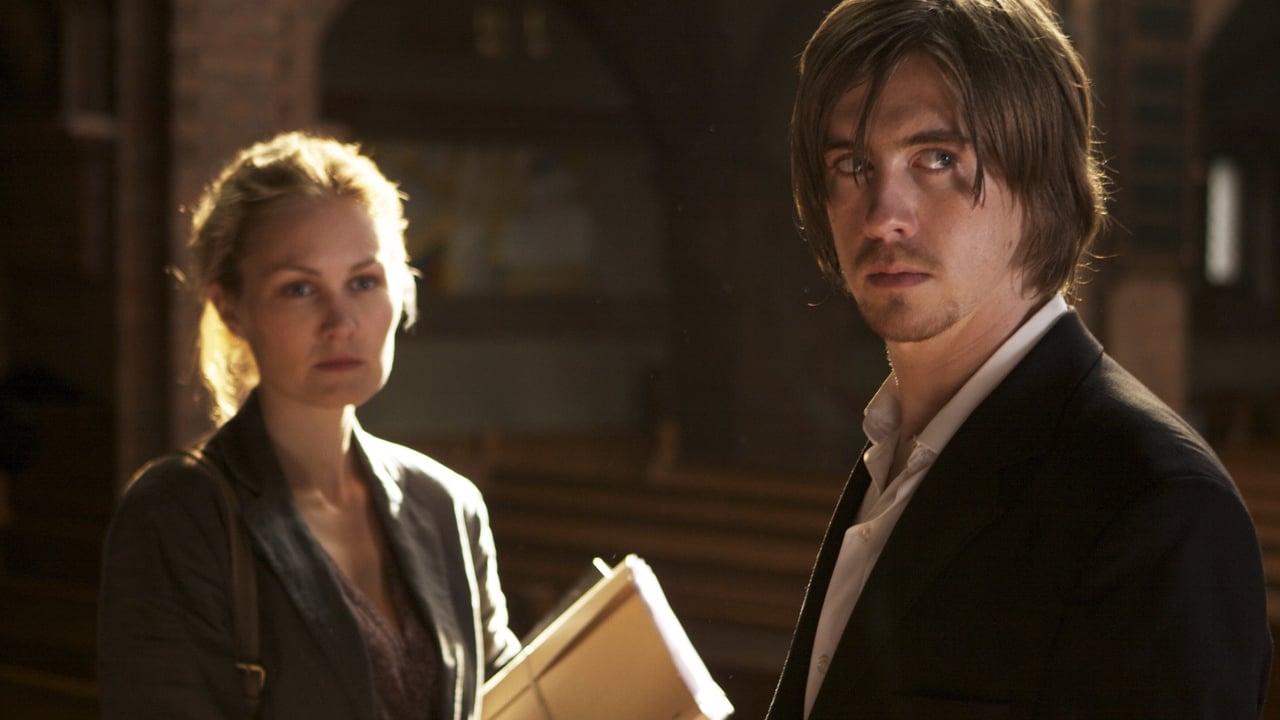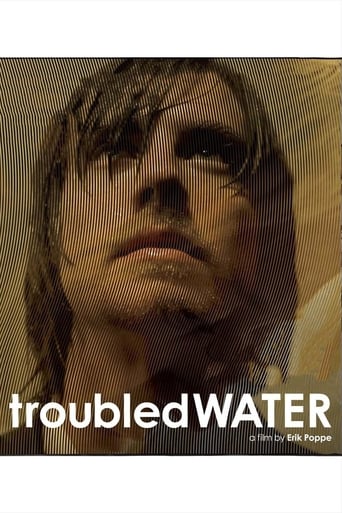



I like the storyline of this show,it attract me so much
View MoreStrong and Moving!
brilliant actors, brilliant editing
True to its essence, the characters remain on the same line and manage to entertain the viewer, each highlighting their own distinctive qualities or touches.
View MoreThis film is going in dark territory. An incident leading to a boy death is the seed of the story. Will it be redemption, revenge, forgiveness, or understanding? It's a bit of everything in a background of light religiosity and evilness. Captivating.
View MoreA member of the relatively uncommon subcategory of films that have both an evil protagonist and powerful theistic themes, DeUsynlige, the fourth film from Norwegian director Eric Poppe, is both an engaging redemption tale and a soul-shaking study in faith. The characters are simultaneously good and evil which casts them in a refreshing and extremely human light. They do things like clean coffee off their sweaters and panic when they realize their number comes up. The nigh flawless acting allows for an immense amount of focus to be paid to what is actually happening in the minds of the characters. Viewers are gifted with the increasingly rare experience of glimpsing the raw and pulsating core of the human condition in a manner that is uncommon if not unique.Having seen Hawaii, Oslo, another film directed by Eric Poppe, the two-sided chronologically- simultaneous plot of the film fell right in line with what I have come to expect from Poppe. That said, to say that the split narrative format of the film contributes powerfully to the plot is a dramatic understatement. The split narrative develops first the character of Thomas right up to the re-collision of the two plot lines: the moment when he experiences the bewilderment and sadness in exactly the same fashion as Agnes. The following cut to the scene where Agnes discovers that her child is missing is the single most important component that makes this styling work. It draws the two of them together and unifies them as human beings with flaws and emotions and really frames the emotional distress experienced to the point where you can feel it weighing in your gut. Viewers are reminded that the character they have empathized with though the entire first half of the film has still done some terrible things. It brings the whole work back to reality and glues together the, otherwise quite tricky, split narrative brilliantly.Faith is perhaps the strongest theme throughout the course of the first half of the film. Thomas' views on religion are bleak and lonely. He sees no value in repentance, prayer, or communion; an odd stance for a man who works in a church. As he slowly begins to heal from his past and recover his normalcy his faith undergoes a parallel transformation. His friendship with Anna serves as a tether while he wades through his mixed feelings of guilt and abandon. With her help he comes to terms with what his past entails and begins to find inner solace. He even begins to partake in communion. His growth in faith opens the world to him. He is no longer constrained by his burden of guilt. He becomes purified and baptised in his growing love of Jens and Anna. The priest tells Thomas to "play them some good church music" and Thomas responds by playing "Bridge Over Troubled Water". In an almost fortuitous choice Thomas acknowledges that life is a struggle and suggests that maybe faith has something to do with a bridge to guard them to safety. The first half of the film is Thomas taking baby steps towards that bridge. His efforts to make a normal life despite his crimes are commendable to say the least. He does not seek forgiveness; only re-acceptance. Consequently, baptism is another powerful theme in the film. Baptism is a rite of admission through which an individual is inducted into the whole. With that in mind when Thomas gives up his christened name of "Jan" he is also accepting his separation from society. In the act of wading into the river to save the life of Jens, Thomas is baptised again and reunited as a unified person. His sins are divinely washed away in the current; as Anna said so confidently prior in the film "God forgives all". However the same does not hold true for humans. A Thomas that is washed clean of sin emerges from the river and submits himself for crucifixion. With his admission to Agnes Thomas resurrects the world against him. Anna, the one who whole heartedly preached the plan of God and forgiveness, casts him out and with a pained submissive understanding Thomas accepts the pain of parting with those he cares deeply about.A split-narrative style film so masterfully sewn together by strong religious themes and images fused with expert camera-work put DeUsynlige on a level that is something more than just a powerful redemption tale. Poppe has created something that does far more than tell a story. The film creates an immense sadness and relief that is almost palpable, and for that I give it top marks.
View MoreWhile watching the movie, I felt that this is an exceptional movie and wondered why this movie does not figure along with the greats. Reminded me of 'Blue' for some reason.Acting is superb and wonderfully subdued acting from the accused protagonist to contrast with the expressive hysterical acting from the mother.The presentation is so very realistic and the plot is so original - never seen a story like this before.Technique of story telling took an interesting turn when the movie started presenting the same timeline in the life of the parents intersecting naturally and unobtrusively with the thread of the accused's life.Certain pieces of organ music in the movie are very striking.There are a few intimate scenes that have been very aesthetically presented. There is no background music whatsoever in the movie and it feels excellently real.Towards the end of the movie, certain aspects did not fit perfectly. The maker wanted to make the central thread take one decisive knot but unfortunately the build up was slightly unnatural.So many unusual things happen in the movie but a very high percentage of these are explainable by the emotional plight of the protagonists.Otherwise, it is a perfect screenplay.There is mastery in all the little little details.Very aesthetic.
View MoreWhat goes through a mother's mind when her child is stolen? Is this response different if the mother figure in this scenario is replaced with a convicted child kidnapper and murderer? What place can faith, relationships, and guilt have in the life of this convicted murderer? Troubled Water, a Norwegian film directed by Erik Poppe, delves into these and other thought-provoking questions concerning family dynamics in somewhat unique situations, guilt and reputation, and faith.The film revolves around the dynamic between a mother and wife, Agnes, and the man who was in the past convicted for the murder of her son, Thomas. Throughout the tale we are able to glimpse the relationship between Thomas and Anna, a priest, as well as the family of Agnes. With Thomas and Agnes' relationship, the themes of faith and the importance of reputation is developed. The role of secrets and the importance of opening up about emotions are explored through the marriage between Agnes and Jon. Agnes also has two adopted children, and their family goes through the decision to, and process of, moving to another country for work. All of these dynamics add different layers to the story, as does the non-chronological organization of the film. The film features snippets of flashback to the incident throughout, as well as having parallel structure. Troubled Water starts off with the story of Thomas. There is a brief flashback to the past incident, but not enough is shown to reveal the magnitude of Thomas' actions. This beginning to the story gives the viewer a unique perspective of sympathy with his character. As the story progresses, this sympathy is deepened until the viewers are, at the end of the story when Thomas' guilt is revealed, able to forgive Thomas as Agnes does. This interesting perspective allows for different ways of looking at ideas of guilt and reputation. Agnes' account comes second, an account of her actions in the same few days. This dual perspective put emphasis on the importance of these two characters, as well as their relationship and their effect on each other. This adds to the richness of the tale, clarifies the focus of the story, and continually questions the viewers' perspectives on guilt, the importance of past events, and reputation.The filmmaking also intensifies the complexity of the story. Choppy scenes as quick snapshots bring in many more little aspects to the plot. For example, on short scene depicts Thomas killing a fly during his efforts to open a window for Anna. Anna stops him and tells him that she'd only wanted the window open to free the fly. Little scenes like this add complexity to both the characters and the plot. In this case, Anna's propensity to protect life is showcased, as well as the straightforward thinking of Thomas.The use of color contrasts, dark and light, are used to exaggerate some common themes in the film: guilt/secrets and hope/love. For example, at one point Agnes and Jon are in their car and telling secrets and the lighting is very dark, almost completely black, with brief flashes of light on their faces. I believe this symbolizes how sharing their secrets show brief hope for their relationship. Often in the movie dark colors are employed before flashbacks to sources of guilt, as well. Alternatively, when Thomas plays the organ in the church, his hope and happiness in the moment aren't directly stated yet are implied with bright sunshine-infused camera shots. The effect of this technique is a closer tie to the emotions of the characters.This film tries to address many complex themes, such as faith, music, and paranoia. However, in my opinion the two most developed and interesting themes were those of family dynamics as well as the aftermath of bad situations. The theme of family dynamics is developed through issues of husbands trying to keep their wives' emotions at home (seen at the dinner party with Jon's boss), the effect on a whole family when one member wants to move to another country, and, most importantly, the tie between adults and children they care about and try to protect. The theme of the effects of momentary bad decisions and bad luck is also a common theme. The guilt, tarnished reputations, and psychological impacts of situations like this collectively make up the most developed theme in this film. From the perspective of Thomas, guilt is developed as well as the far-reaching and community-implied importance of maintaining a good reputation. The viewer is forced to feel sympathy for Thomas when Anna discovers his past and yells at him. The film offers a rebuttal to the societal disdain for sullied pasts, seeming to question the extreme importance of past actions and mistakes on the degree to which a person is accepted and viewed in the present. The film does a good job of not being radical on this and other points, yet simply asks questions which broaden the viewer's understanding of certain issues.This highly-layered and inquisitive film is well-made and well-developed, accomplishing its goal of leaving the viewer with a greater understanding of the complexity of all situations. After all, what good is a world that is simply black and white?
View More